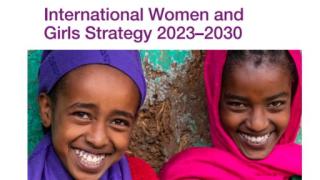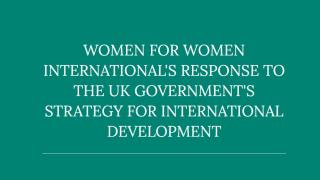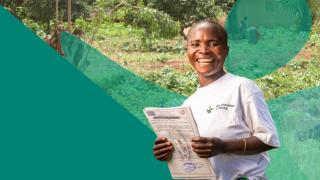White Paper response
Earlier this week, the UK Government published its new White Paper setting out its future approach to international development.
From an initial read of the paper, we have seen a welcome shift in gears. This includes a renewed focus on fragile and conflict affected settings (FCAS) and a recognition of a needed change in approach for partnering with women’s rights organisations (WROs). We have seen these promises embedded across UK Government strategies in 2023, including in the International Women and Girls Strategy and the UK Government’s 5th National Action Plan (NAP) on Women, Peace and Security (WPS). Our response to this White Paper is the same as our responses to these earlier strategies: that these commitments to women’s rights are important, and welcomed. But we are left with the same concerns – that without investing in diverse resources and reversing the aid budget cuts that reduced the UK’s percentage of gross national income (GNI) spent on Overseas Development Assistant (ODA) from 0.7% to 0.5%, policy ambitions will never make it to practice.
At Women for Women International, the last thirty years of our holistic programming has shown us that marginalised women living in conflict affected contexts continue to be disproportionately impacted by global crisis.
This includes the compounding effects of conflict and insecurity, climate change, rising poverty and gender inequality. Advancing gender equality and investing in and listening to women and women’s rights organisations (WROs) is absolutely fundamental for addressing intersecting global crises and implementing the SDGs. We have continuously advocated for this, and so whilst we recognise and welcome the policy shift to directing most of the UK’s ODA towards FCAS and centring women and girls in this, we are concerned by the surface-level interconnection between these two objectives and how this will translate into implementation within a limited funding landscape.
We know that a fundamental pathway to understanding the interconnected role of WROs in driving peace and security is to invest in meaningful partnerships with them.
We have seen this firsthand through learnings from our partnerships on the Resourcing Change project in South Sudan, Yemen and Nigeria; flexible, long-term funding can be transformative for locally-led peace and security. When WROs are consulted as co-creators of policies, programmes and strategies that impact their interventions, long-term and meaningful change can happen. We are pleased to see aspects of our recommendations on meaningful partnerships recognised across the White Paper, including a move away from the current model of International Development that is not working, an intention for the UK Government to “acknowledge [its] past” and a shift to more meaningful principles for partnerships that include transparency, ownership, and mutuality.
The White Paper's commitment to listening to solutions of locally-led groups is important, but it is not clear what changes in practice we can expect to see that will realise this needed shift in the UK’s approach to consultation and implementation.
Therefore, it is with caution that we recognise the emphasis on locally-led interventions given that the White Paper does not set out clearly how the priorities and expertise of WROs will be leveraged to forge meaningful partnerships. As evidence shows, failure to include women and women’s rights organisations’ varied knowledge and voice will limit the effectiveness of the interventions developed and the outcomes achieved.
Based on our initial reflections of this White Paper, we are clearly left with the same concerns and questions as before, but perhaps with more hope than we have had previously - hope for transparency, accountability, long-term funding commitments, a prioritisation of women’s rights in conflict, and for women and WRO’s to be listened to and invested in. But hope alone will not drive change, and with the UK Government not planning to reinstate 0.7% of GNI spent on ODA until "the fiscal situation allows" it risks continuing to be a case of rhetoric rather than reality.
Read more of our policy responses:
The UK Government’s International Women and Girls Strategy sets out an ambitious vision for achieving gender equality, but should not be celebrated until it takes the urgent steps needed to turn policy into action.
17 MAY 2022 | The UK Government must go further to ensure they listen to marginalised women and girls to inform their approach to International Development.
Research and Evidence
subtitle:
We know how valuable it can be to use learning and evidence to support our advocacy work. Here you can find our evidence hub, containing all of our published briefings, reports, situational assessments, research and data on the range of issues we work on.



